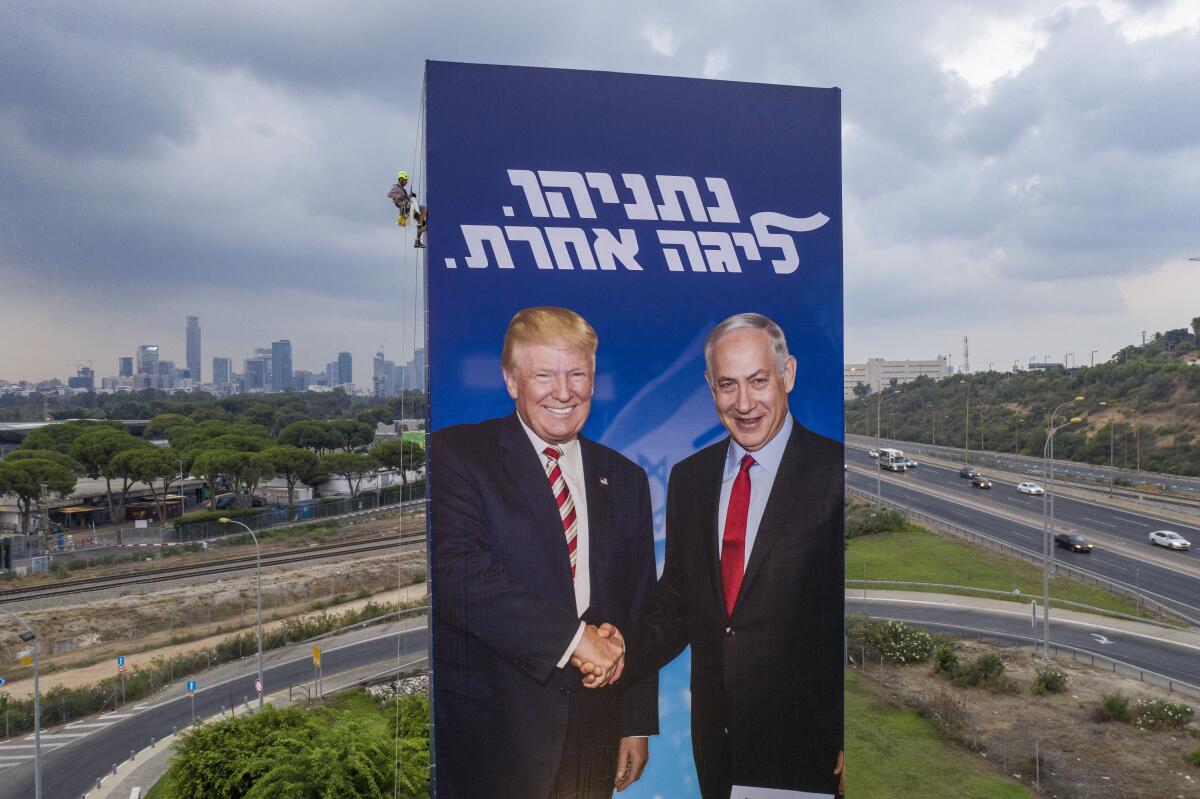Opinion: What Netanyahu and Israelis learned from the Trump playbook

- Share via
Early in 2019, as Israel was heading into a divisive parliamentary election, a massive campaign poster along a Tel Aviv freeway showed Prime Minister Benjamin Netanyahu shaking hands with President Trump. Now, five such elections and one near-civil war later, that same highway has been repeatedly blocked by protesters against Netanyahu’s plan to place the country’s Supreme Court under his political control.
Nothing could be more grimly appropriate to the crisis of democracy in Israel than the notion of Trump’s image looming over it. For however much the turmoil in Israel arises from some distinctively Israeli causes, such as the nation’s continuing lack of a constitution, Netanyahu and his far-right coalition have made the Trump playbook their political Torah.
Netanyahu portrayed his bromance with Trump as the essential factor in the president’s many unreciprocated concessions to Israel — moving the American Embassy to Jerusalem; recognizing Israeli sovereignty over the Golan Heights; pulling the United States out of the Iran nuclear arms deal; ignoring and undermining the Palestinian Authority.
And Netanyahu was hardly taking a risk in conflating himself with Trump. A Pew Research Center poll in early 2020 found that 71% of Israelis approved of Trump. In other words, Israeli support for Trump exceeded by roughly 20 points the one-half share of Israeli voters who backed Netanyahu’s various right-wing coalitions in the last five Knesset elections.
Perhaps many of those centrist and center-right Israelis genuinely believed that accepting the benefits of Trump’s largesse was not tantamount to endorsing his brand of demagogic, antidemocratic rule. Presumably, they were like the untold millions of Trump voters in America who said they wished he wouldn’t tweet so much but loved his border wall.
The problem in both America and Israel is that, when it comes to Trump, you cannot separate whatever purports to be a policy agenda from the relentless and deliberate effort to erode democracy itself. As Rick Wilson of the Lincoln Project titled a book that was released about the same time as the Tel Aviv billboard went up, “Everything Trump Touches Dies.”
Being an American Jew and a liberal Zionist, I have often heard from Israelis that people like me just don’t understand the dangerous neighborhood in which the Jewish state exists. And that’s true. I don’t go through every day weighing the risks of a Hamas suicide bomber, an Iranian nuclear weapon, a wave of Hezbollah missiles.
But when I was decrying Trump as a candidate and president — an opinion shared by the overwhelming majority of American Jews who voted against him in both 2016 and 2020 — I was saying that America is also a dangerous neighborhood with some cautionary lessons to teach. Trump did not come from nowhere. He traveled the hateful path trod by Andrew Jackson, Jefferson Davis, Charles Coughlin, Gerald L.K. Smith and George Wallace. It’s revealing that the most toxic figure in Israeli political history until Netanyahu was Rabbi Meir Kahane, born and bred in America, where his anti-Black racism anticipated the anti-Arab version he espoused in Israel.
A previous version of Israel saw fit to outlaw Kahane’s political party. Now that party’s descendants form integral members of Netanyahu’s narrow governing majority. If that scenario sounds more than a little like America in the Trump years, it should. The parallels are instructive and ominous.
Trump narrowly won election in a backlash against the multiracial democracy embodied by his predecessor, Barack Obama; Netanyahu assembled his current majority in backlash against a previous coalition that dared to include an Israeli Arab party along with a wide spectrum of Jewish Israeli ones.
Trump welcomed into his movement the type of racists, antisemites and neo-Nazis previously considered radioactive to any presidency; Netanyahu not only included in his coalition such settler extremists as Itamar Ben-Gvir and Bezalel Smotrich, but bought their participation with ministerial appointments.
(Ben-Gvir’s consent was required on Monday for Netanyahu to suspend parliamentary action of the judicial takeover, and Ben-Gvir’s reward was reportedly the prime minister’s promise to create a new militia under the radical politician’s control.)
Trump interpreted his dubious electoral mandate, which included losing the popular vote to Hillary Clinton by several million votes, as license to populate the federal courts and the Supreme Court itself with right-wing judges and to attempt to control the American military as his personal army; Netanyahu, having scraped together a thin majority in the Knesset, set out to seize control of Israel’s Supreme Court.
This stunt is happening, of course, at the same time when the prime minister faces charges of bribery and fraud with the potential of being barred from office. In one more parallel, Trump’s first indictment may be just days away. Depicting themselves as tribunes of the real people, the former president and prime minister alike blame their troubles on the “elite.”
When Netanyahu postponed the next stage of his judicial overhaul on Monday, he may have spared Israel its own Jan. 6 insurrection, at least for the moment. And in the streets of Israel, carrying the flag of genuine patriotism during all of their marches, his multitude of opponents may have shown both their country and the United States the example of standing up to MAGA in any language.
Samuel G. Freedman is the author of books including “Jew vs. Jew: The Struggle for the Soul of American Jewry.”
More to Read
A cure for the common opinion
Get thought-provoking perspectives with our weekly newsletter.
You may occasionally receive promotional content from the Los Angeles Times.










